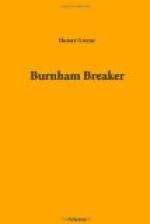“Do you remember,” the old man asked, “the Cherry Brook bridge disaster that occurred near Philadelphia some eight years ago?”
“Yes,” replied Burnham, straightening up in his chair, “I do; I have good reason to remember it. Were you on that train?”
“I was on that train. Terrible accident, wasn’t it?”
“Terrible; yes, it was terrible indeed.”
“Wouldn’t have been quite so bad if the cars hadn’t taken fire and burned up after they went down, would it?”
“The fire was the most distressing part of it; but why do you ask me these questions?”
“You were on board, I believe, you and your wife and your child, and all went down. Isn’t that so?”
“Yes, it is so. But why, I repeat, are you asking me these questions? It is no pleasure to me to talk about this matter, I assure you.”
Craft gave no heed to this protest, but kept on:—
“You and your wife were rescued in an unconscious state, were you not, just as the fire was creeping up to you?”
The old man seemed to take delight in torturing his hearer by calling up painful memories. Receiving no answer to his question, he continued:—
“But the boy, the boy Ralph, he perished, didn’t he? Was burned up in the wreck, wasn’t he?”
“Stop!” exclaimed Burnham. “You have said enough. If you have any object in repeating this harrowing story, let me know what it is at once; if not, I have no time to listen to you further.”
“I have an object,” replied Craft, deliberately, “a most important object, which I will disclose to you if you will be good enough to answer my question. Your boy Ralph was burned up in the wreck at Cherry Bridge, wasn’t he?”
“Yes, he was. That is our firm belief; what then?”
“Simply this, that you are mistaken.”
“What do you mean?”
“Your boy is not dead.”
Burnham started to his feet, unable for the moment to speak. His face took on a sudden pallor, then a smile of incredulity settled on his lips.
“You are wild,” he said; “the child perished; we have abundant proof of it.”
“I say the child is not dead,” persisted the old man; “I saw him—yesterday.”
“Then, bring him to me. Bring him to me and I will believe you.”
Burnham had settled down into his chair with a look of weary hopelessness on his face.
“You have no faith in me,” said Craft. “Mere perversity might make you fail to recognize the child. Suppose I show you further proofs of the truth of what I say.”
“Very well; produce them.”
The old man bent down, took his leather hand-bag from the floor, and placed it on the table before him. The exertion brought on a spasm of coughing. When he had recovered from this, he drew an old wallet from his pocket and took from it a key, with which he unlocked the satchel. Then, drawing forth a package and untying and unrolling it, he shook it out and held it up for Robert Burnham to look at. It was a little flannel cloak. It had once been white, but it was sadly stained and soiled now. The delicate ribbons that had ornamented it were completely faded, and out of the front a great hole had been burned, the edges of which were still black and crumbling.




